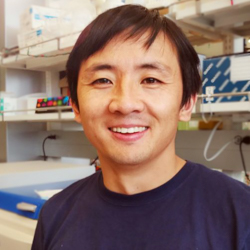Biography
Dr. Peng Mao holds a doctorate from Peking University, China. He uses next-generation sequencing and bioinformatics methods to study where DNA sustains damage in the genome and how DNA repair proteins function in the context of chromatin. He has developed two cutting-edge methods, namely, CPD-seq and NMP-seq, to map entire genomes to find lesions resulting from ultraviolet light and small base modifications resulting from alkylating agents.
Personal Statement
Dr. Peng Mao’s recent research has been focused on mechanisms underlying cancer mutagenesis, with a particular interest in understanding how DNA damage (e.g., UV photolesions) impacts mutation distribution in the melanoma genome. He has developed CPD-seq (cyclobutane pyrimidine dimer sequencing), a novel NGSbased method that allows him to precisely map UV light-induced CPD lesions at single nucleotide resolution across the human genome. By combining CPD-seq with techniques in biochemistry, genetics, mammalian cell biology, and genomics, Dr. Mao’s work has started to illustrate the important roles of nucleosomes (the basic building blocks of chromatin) and transcription factors in modulating UV damage and repair, and thus shaping the mutational landscape in the melanoma genome. He has published a series of research papers characterizing melanoma mutation mechanisms, including his first or co-first author papers published in high profile journals (e.g., Mao et al., PNAS. 2016; Brown* and Mao* et al., PLOS Genetics. 2018; Mao et al., Nature Communications. 2018; Mao et al., Genome Research. 2020), and his senior author manuscript in his independent research group (Mingrui Duan et al., under review). Additionally, he has developed another damage mapping method, NMP-seq, to analyze small base damage induced by DNA alkylating agents (Mao et al., Genome Research. 2017). Data generated with NMP-seq has shown a new mechanism by which specific DNA repair proteins may contribute to drug resistance during chemotherapy with alkylating agents. Dr. Mao’ s broad expertise in DNA damage, DNA repair, and cancer mutagenesis using genomics will allow him to further investigate molecular mechanisms for important cancer mutations, including non-coding mutations in gene promoters. Furthermore, as a new principle investigator at UNMCCC, Dr. Mao has established a group of collaborators, whose expertise in DNA repair, cancer biology, and bioinformatics, will aid him in directing his research projects.
Areas of Specialty
DNA repair
Cancer mutations
Genome stability
Gender
Male
Languages
- English
Research
Courses Taught
BIOM507
BIOM522 (Course co-director)
Research and Scholarship
Dr. Mao has developed new next-generation sequencing and bioinformatics tools for studies of DNA damage and repair at the genome level.

